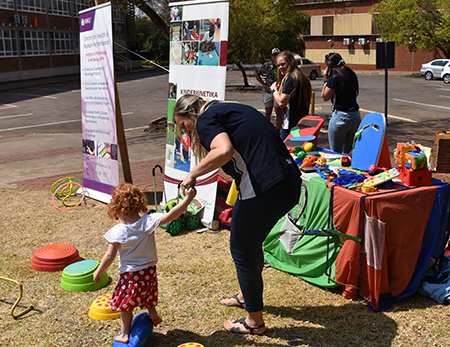Albert Einstein once said: “If you want your children to be intelligent, read them fairy tales. If you want them to be more intelligent, read them more fairy tales.”
It is an alarming fact that, in the modern era in which we find ourselves, children do not get enough exposure from parents or caregivers with regard to storytelling and being read to.
In hosting a storytelling initiative on 6 September, the North-West University’s (NWU’s) Institute of Psychology and Wellbeing embarked on a project through which parents learnt just how to get their children to flourish in life.
According to Hanlie Degenaar, one of the institute’s speech-language therapists, parents are quite unaware that emerging reading development starts before the age of six months.
She says exposing children to story activities at home is the best way to help them develop a love for reading and to advance their reading skills.
“Research indicates that daily story time at home provides a solid foundation for reading success later. Story time is more than just reading a story. It should stimulate conversation, new words, listening, fun and actions. There are good indications that children who regularly deal with print stories get many benefits from them.
“Their confidence can be boosted, they gain an edge in language development and they develop the ability to think critically. Exposure to stories in a creative way also has a positive impact on young children's self-regulation and behaviour,” she says.
During this project, parents, grandparents and other caregivers learned how to set up story time in such a way that a love of reading is developed. The day was filled with information and activities to get young children into the habit of reading.
“It's an investment in the family, which can be fun and exciting for everyone. Reading skills, which are critical to academic achievement, start at home,” says Hanlie.
The fact is that reading and written language skills start to develop soon after birth.
“Emergent literacy skills are essential building blocks in the integrative development of reading and written language development in young children. It is widely recognised that there is a pressing need for developing and optimising literacy skills in very young children.
“Also, a child’s vocabulary and phonological awareness skills at around three years of age are the best predictor for reading success later. Language development, listening skills and shared book reading are powerful tools parents and educators can utilise to develop reading readiness in young children. However, parents and caregivers do not always have the necessary information at hand to use opportunities for developing reading in their children. We wanted to equip them with it.”
Attending children and parents had the opportunity to have a picnic on the main lawn of the campus in Potchefstroom, with the NWU’s mascots, Pukki and Eagi, as the local entertaining characters of the day.
For more information about the Institute of Psychology and Wellbeing’s initiatives and projects, please contact 018 299 1737 or send an email to IPWinfo@nwu.ac.za.

Young and old enjoyed the NWU’s storytelling initiative and picnic on the campus in Potchefstroom.
